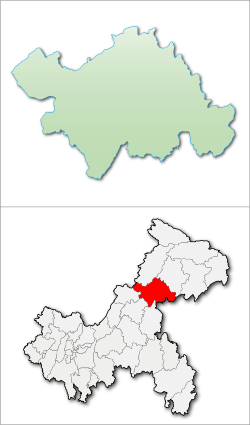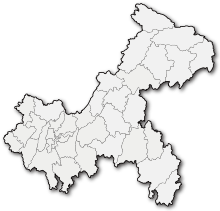Wanzhou District
| Wanzhou 万州区 | |
|---|---|
| District | |
|
Skyline of Wanzhou | |
 Wanzhou District in Chongqing | |
| Coordinates: 30°48′28″N 108°24′32″E / 30.807819°N 108.408751°E | |
| Country | People's Republic of China |
| Municipality | Chongqing |
| Area | |
| • Total | 3,457 km2 (1,335 sq mi) |
| Population (2013) | |
| • Total | 1,753,500 |
| • Density | 510/km2 (1,300/sq mi) |
| Time zone | China Standard (UTC+8) |
| GDP | 2013 |
| - Total |
CNY 70.23 billion (US$ 11.46 billion) |
| - Per capita |
CNY 43,197 (US$ 7,047) |
| Licence plate prefix | 渝F |
| Website |
wz |
Wanzhou District (simplified Chinese: 万州区; traditional Chinese: 萬州區; pinyin: Wànzhōu Qū) is a city on the upper reaches of the Three Gorges of the Yangtze River in China. It is currently governed as a district of Chongqing Municipality, bordering Sichuan to the northwest and Hubei to the southeast. It was formerly known as Wanxian or Wan County (simplified Chinese: 万县; traditional Chinese: 萬縣; pinyin: Wànxiàn). Prior to Chongqing's formation as a direct-controlled municipality, Wanzhou was part of Sichuan province. The urban core of Wanzhou is 228 km (142 mi) away from Chongqing's city proper.
"Wanzhou" literally means "myriad-prefecture", where "a myriad rivers converge and a myriad traders gather" (万川毕汇、万商云集). Due to the construction of the Three Gorges Dam, 47% of Wanzhou's old urban area will be underwater by the time the reservoir is filled. Buildings in the submerged area have been torn down and new ones rebuilt on higher ground.
History

The district was part of Wanxian Prefecture, then the prefectural Wanxian City. It was renamed to Wanzhou in late 1990s.
It was part of Quren District of Ba Prefecture (巴郡朐忍县) in the Qin Dynasty. It became Yangqu District (羊渠县) in 216 (the Eastern Han Dynasty). In 230 (the Shu-Han Kingdom), it was renamed to Nanpu (南浦县); in 553 (the Western Wei Dynasty), to Yuquan (鱼泉县); in 557 (Northern Zhou Dynasty), to Anxiang (安乡县); in 584, to Wanchuan (万川县); and in 598 (Sui Dynasty), to Nanchang again.
It continued to be renamed and administrated with slight differences. In the 19th century, it was known in English as Wanhsien and Wan County In 1935, it became Wanxian Zhuanqu (万县专区). On December 12, 1992, the State Council abolished Wanxian Prefecture and its subordinate Wanxian City and created the prefecture-level Wanxian City, which administered the districts of Longbao (龙宝区), Tiancheng (天城区), Wuqiao (五桥区) and the counties of Kai, Zhong, Liangping, Yunyang, Fengjie, Wushan, Wuxi, and Chengkou.
The entire Wanxian City was merged into Chongqing on December 20, 1997. The merge necessitated the abolishment of Wanxian City and creation of Wanxian District and Wanxian Migration Development Area (移民开发区). Wanxian City's three districts were converted to administrative committees (管理委员会, abbreviated 管委会) of Wanxian District. The migration development area included the counties formerly in Wanxian City, except Liangping and Chengkou, which were administered by Chongqing directly.
On May 22, 1998, the State Council approved that the two areas named Wanxian were both renamed to Wanzhou. The migration development area later dissolved and its counties were directly controlled by Chongqing. On July 19, 2000, the district's administrative committees were changed to migration development areas.
Geography and climate
Wanzhou spans 30°24′−31°14′ N latitude and 107°55′−108°53′ E longitude, and is situated at the eastern edge of the Sichuan Basin. It reaches a maximal north-south extent of 67.25 km (41.79 mi) and east-west width of 97.25 km (60.43 mi), covering an area of 3,214 km2 (1,241 sq mi). Elevations range from 106 m (348 ft) in the town of Tailong (太龙镇) to 1,762 m (5,781 ft) at Shaping Peak (沙坪峰) of the Qiyao Mountains (齐曜山).[1] Bordering county-level divisions:
- Yunyang County – east
- Shizhu County – south
- Lichuan, Hubei – south
- Zhong County – west
- Liangping County – west
- Kaijiang County, Sichuan – north
- Kai County – north
Similar to the city proper of Chongqing, Wanzhou has a monsoon-humid subtropical climate (Köppen Cwa) with short, mild winters, and very hot, humid summers, and is in fact on average 0.5 °C (0.9 °F) warmer during the day. The monthly 24-hour average temperature ranges from 7.0 °C (44.6 °F) in January to 28.3 °C (82.9 °F) in August, while the annual mean is 17.95 °C (64.3 °F).
| Climate data for Wanzhou District (1971−2000) | |||||||||||||
|---|---|---|---|---|---|---|---|---|---|---|---|---|---|
| Month | Jan | Feb | Mar | Apr | May | Jun | Jul | Aug | Sep | Oct | Nov | Dec | Year |
| Record high °C (°F) | 20.3 (68.5) |
24.6 (76.3) |
32.5 (90.5) |
36.5 (97.7) |
39.5 (103.1) |
38.6 (101.5) |
40.6 (105.1) |
42.1 (107.8) |
41.2 (106.2) |
35.8 (96.4) |
28.2 (82.8) |
19.5 (67.1) |
42.1 (107.8) |
| Average high °C (°F) | 10.4 (50.7) |
12.8 (55) |
17.4 (63.3) |
23.2 (73.8) |
27.4 (81.3) |
29.8 (85.6) |
33.4 (92.1) |
34.3 (93.7) |
28.7 (83.7) |
22.9 (73.2) |
17.6 (63.7) |
12.0 (53.6) |
22.5 (72.5) |
| Daily mean °C (°F) | 7.0 (44.6) |
8.7 (47.7) |
12.8 (55) |
18.1 (64.6) |
22.4 (72.3) |
25.2 (77.4) |
28.1 (82.6) |
28.3 (82.9) |
23.8 (74.8) |
18.6 (65.5) |
13.6 (56.5) |
8.8 (47.8) |
18.0 (64.4) |
| Average low °C (°F) | 4.5 (40.1) |
5.8 (42.4) |
9.4 (48.9) |
14.4 (57.9) |
18.8 (65.8) |
21.8 (71.2) |
24.3 (75.7) |
24.2 (75.6) |
20.6 (69.1) |
15.8 (60.4) |
11.0 (51.8) |
6.6 (43.9) |
14.8 (58.6) |
| Record low °C (°F) | −3.4 (25.9) |
−1.7 (28.9) |
−0.1 (31.8) |
2.6 (36.7) |
11.2 (52.2) |
15.4 (59.7) |
17.6 (63.7) |
18.1 (64.6) |
13.4 (56.1) |
5.3 (41.5) |
0.8 (33.4) |
−3.7 (25.3) |
−3.7 (25.3) |
| Average precipitation mm (inches) | 15.5 (0.61) |
17.1 (0.673) |
43.2 (1.701) |
101.9 (4.012) |
170.9 (6.728) |
210.5 (8.287) |
200.3 (7.886) |
146.8 (5.78) |
154.1 (6.067) |
104.6 (4.118) |
45.5 (1.791) |
18.6 (0.732) |
1,229 (48.385) |
| Avg. precipitation days (≥ 0.1 mm) | 7.7 | 7.7 | 11.2 | 14.6 | 15.6 | 15.2 | 12.7 | 10.9 | 12.9 | 13.7 | 10.3 | 8.5 | 141.0 |
| Source: Weather China | |||||||||||||
Subdivisions
The 4 primary subdivisions are 3 migration development areas (Longbao, Tiancheng, Wuqiao) and Jiangnan New District (江南新区). The 92 secondary subdivisions are 16 sub-districts, 33 towns, and 43 townships (see Administrative divisions of the People's Republic of China#Levels). In 2000, the district included 32 towns, 45 townships, 14 sub-districts, and 1277 neighborhood and village committees.
Tiancheng
29 subdivisions:
|
5 sub-districts:
|
15 towns:
|
9 townships:
|
Wuqiao
36 primary divisions:
|
3 sub-districts:
|
11 towns:
|
23 townships:
|
Jiangnan
2 subdivisions:
|
2 sub-districts:
|
0 towns | 0 townships |
Longbao
27 primary subdivisions:
|
7 sub-district:
|
7 towns:
|
11 townships:
|
Colleges and universities
Chongqing Three Gorges University (重庆三峡学院) Chongqing Three Gorges Medical College (重庆三峡医药高等专科学校) Chongqing Three Gorges Polytechnic College (重庆三峡职业学院) Chongqing Information Technology College (重庆信息技术职业学院) Chongqing Preschool Education College (重庆幼儿师范高等专科学校) Chongqing Vocational Institute of Safety & Technology (重庆安全技术职业学院) Chongqing Institute of Fashion and Engineering (重庆服装工程职业学院)
Transport
Wanzhou has three Yangtze River crossings.
References
- ↑ 1995版《万县志》 概述 1
External links
| Wikimedia Commons has media related to Wanzhou District. |
- Official site (in Simplified Chinese)
- Wanxian Travel
| ||||||||||||||
| ||||||||||||||||||||||||||||||||||||||||||||||


